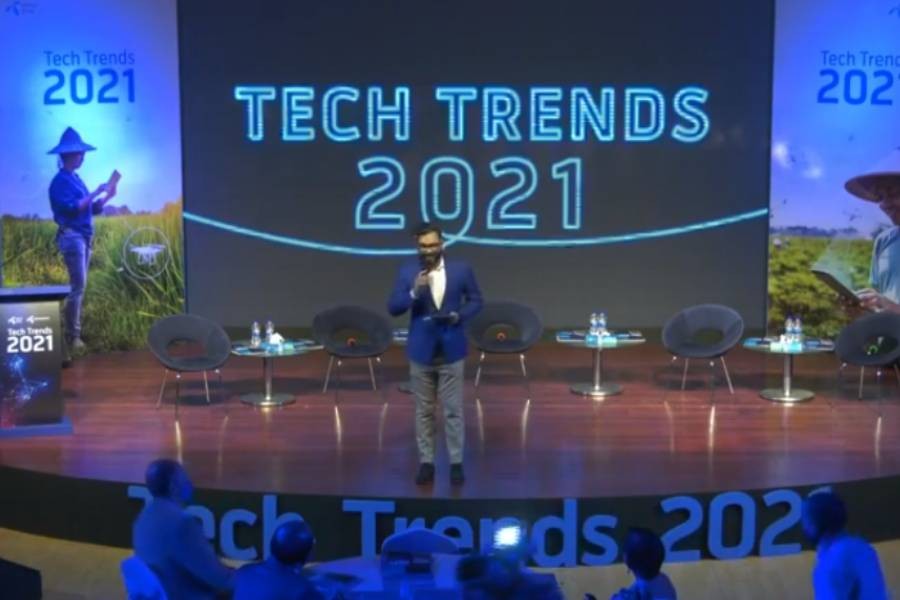Tech supplements to address mental health problems, digital spring for green tech, password panic and education gaps are some of major areas technological innovations will focus on in 2021, according to a research.
It also said these new tech trends will actually shape the post-pandemic world in 2021 and beyond.
Grameenphone revealed the findings of the study, carried out by its parent company Telenor, at an interactive event held at GP House in the city on Monday.
Telecom giant Telenor Research identified five key different technology trends that will shape 2021.
The sixth edition of Tech Trends by Telenor Research team identified that the emergence of innovative technologies addressing remote education and work, rising data security concerns, increased usage of environmentally-friendly solutions and combating loneliness.
Bjørn Table Sandberg, Head of Telenor Research, virtually delivered a keynote speech during the session.
He said the pandemic has triggered everyone and nearly every industry around the globe to adapt at a rate once thought impossible.
"The past year has proved that digitalization will be a key to tackling major societal issues and facilitating new ways of working and living in 2021."
Bangladesh Telecommunications Regulatory Commission (BTRC) chairman Shyam Sunder Sikder said the ambition of a 'Digital Bangladesh' set by the government is becoming a reality.
"Our digital resilience has allowed us to quickly adopt health guidelines during this pandemic to keep our citizens safe and maintain our economic momentum."
The technology trends being forecast will play a crucial role in guiding innovators, enterprises and experts in creating solutions that matter to citizens, he added.
In 2021, Telenor Research predicts the emergence of new technology to aid remote learning and changes to the virtual education ecosystem.
"As we move down in 2021 where working from home is already new normal, organizations will now focus on building capacity to use new digital tools, upskilling and data and cyber security."
It further said ensuring mental wellbeing using advanced technologies like Augmented Reality (AR), Virtual Reality (VR) and advanced AI-based chatbots for those experiencing prolonged isolation will also come into play.
AI will also be implemented to optimize energy consumptions. It will help make renewable energy, such as wind power, more predictable, and 'smarten' up cities by optimizing transport and predicting overall quality of environment and life, the study said.
Yasir Azman, CEO of Grameenphone, reemphasized that Bangladesh on a united front has progressed significantly in digitalization journey and helped the country navigate Covid-19 pandemic lately.
"We have experienced a massive shift in our behaviours, minimizing the physical and virtual world's boundaries."
These tech projections show that technology and connectivity will play a pivotal role in ensuring our mental wellbeing, modernizing the education system to becoming a knowledge-based economy, promoting green-tech agendas, and keeping us safe in online space towards a better Bangladesh, he added.
In order to make it happen, he said, they are committed to collaborating with the regulator, ecosystem player, innovators and policymakers.
Anir Chowdhury, policy advisor of a2i, Sonia Bashir Kabir, founder of SBK Tech Ventures and SBK Foundation, and Dr. Mehtab Khanam, Counselling Psychology at University of Dhaka, also took part in the panel discussion.
While presenting the findings, Bjørn Table Sandberg said as the Covid-19 lockdowns have led to a wave of innovations and important progress in digital learning, it has done less to reduce the global education gap.
"Millions of children and young people who currently lack internet access at home suffered the loss of education in 2020 when schools went into lockdowns."
It is expected to see an escalating number of new and creative methods of remote, digital learning in 2021 to emerge from rapidly advancing virtual learning sphere, he added.
Those equipped with network access and internet-capable devices will be able to take part in this digital leap and reap the rewards. The unconnected will, however, lose ground, he said.
"If this urgent issue is not properly addressed, both internationally and within nations, we risk significant setback and a widening educational gap in the coming years."
In order to bridge this gap, Sandberg said, the education sector and ICT actors must join forces, working together to ensure robust and faster networks, and promote and support digital literacy for all.


